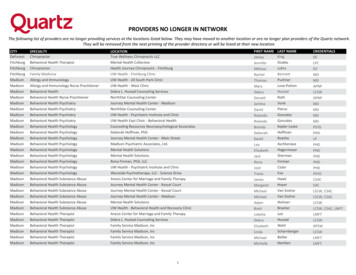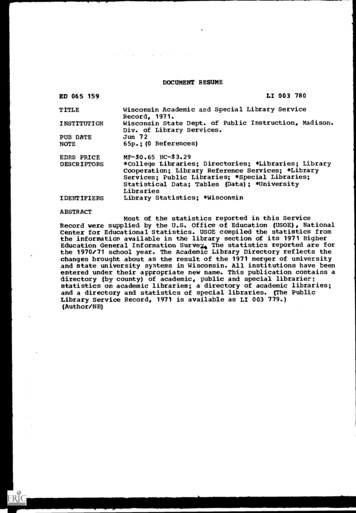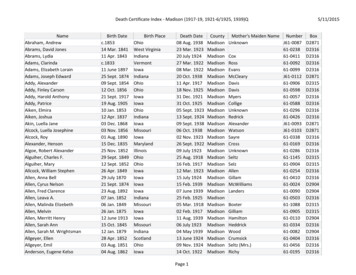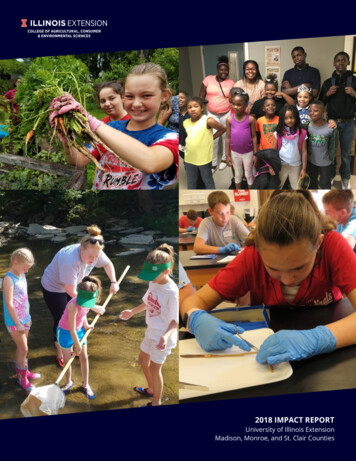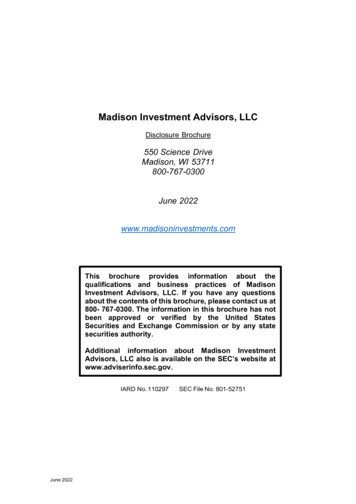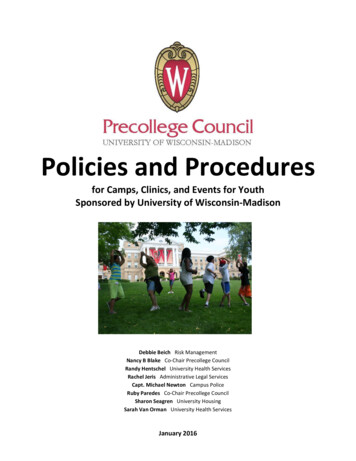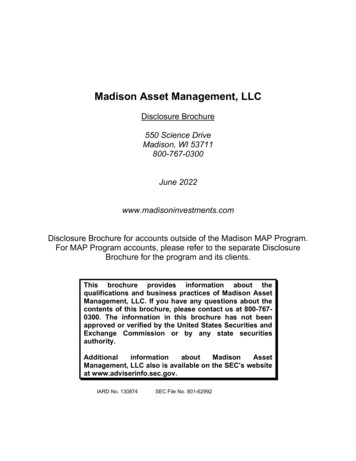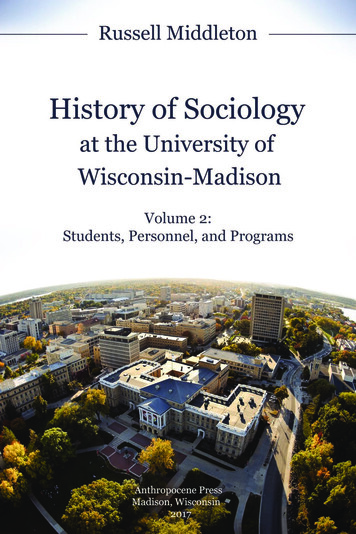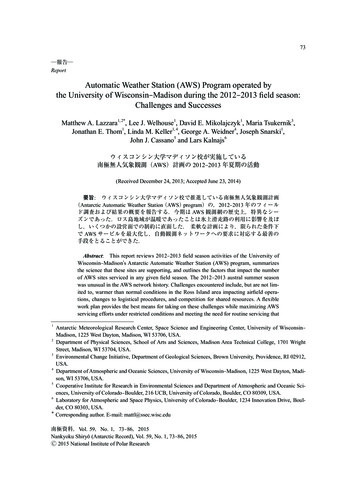
Transcription
UW-MadisonGlobalHealthImpactReport2013/14It takes a village to advance health today and ensureequitable, sustainable health for tomorrow. The GlobalHealth Institute at the University of WisconsinMadison is building bridges between researchers,health care professionals, staff, students, fellows andcommunities to tackle the complex, interlinked causesof disease.In 2013-2014, GHI supported research from acrosscampus with a series of awards. Our events showcasedthe diversity of people engaged in addressing globalhealth challenges, and our education programs helpedprepare a new generation of students to become worldcitizens.Here you’ll find stories that provide a snapshot of ourwork and successes.
From the directorAs the Global Health Institute (GHI) begins its fourth year, the need for aholistic approach to well-being in Wisconsin and across the world has never been greater. Evidence mounts daily that the future of humans, animalsand the environment are deeply intertwined and facing unprecedentedchallenges. That is why GHI works to engage all of UW-Madison and localand international partners toward a comprehensive approach to health.The Institute is articulating and practicing a new global health ethic, whichinvites us to pursue health for today while ensuring natural and otherresources are available for health tomorrow. It extends the forward-thinking tradition of the Wisconsin Idea and builds on Professor Aldo Leopold’sland ethic that called for recognizing the entire ecosystem as part of ourcommunity. The ethic also meshes with the UW-Madison’s pioneeringwork in disease prevention and biotechnology.Our efforts in 2013-2014 have exemplified a multi-sector response to global health. GHI supported new, interdisciplinary research and our eventsand visiting scholars program brought those on global health’s front linesto UW-Madison. We also are at the forefront of new campus initiatives toimprove well-being for women and promote livable cities.Jonathan PatzDirector, Global Health InstituteProvost Paul DeLuca has been an unfailing supporter and valued partnerfor GHI, and we offer our thanks as he transitions back to teaching andresearch. Paul turned the conclusions of UW’s Reaccreditation Report intoreality by advancing global health as a full campus enterprise.I am also happy to announce that Christopher Olsen, a professor of Public Health in the School of Veterinary Medicine, will serve as acting GHIdirector during my sabbatical during the coming academic year. My workand a Fulbright Scholar Award take me to Geneva, Switzerland, andEthiopia to work on climate change/public health policy. Chris has been apioneering force for global health on this campus since its inception andbrings a special focus on “One Health.”I am grateful to so many of you for your engagement and support ofUW-Madison’s global health efforts to date. We are well-positioned as weembrace the next academic year with clear purpose to promote this newglobal health ethic.On the cover: Eighty-two percent of Ethiopia’s more than 90 million people live in rural areas. UW-Madison faculty, staff and studentsare collaborating with in-country colleagues to address health challenges in the face of explosive population growth and urbanizationin a land with limited resources. (Photo by Jonathan Patz.)Above: Jonathan Patz (Photo by Sarah Rose Smiley.)2013-2014 UW Global Health Institute Impact Report 2
Educating world citizensBy the numbers:Global Health CertificatesStudents learn from diverse communities206“It’s one thing to read about health problems in literature, but another entirely to see them on the ground. (The field experience in Uganda) is what set it in stone. I want to be part of this.”—DeMarco Bowen, graduate certificate student withundergraduate field experience working with HIV in UgandaField courses take UW-Madison students around the world and intoWisconsin’s rural and urban neighborhoods. They introduce students tothe world’s cultures and give them opportunities to participate in projectsthat improve health. Students have helped in a variety of ways, includingsupporting youth leadership programs, building safe paths to schools andworking with veterinarians to improve the health of domestic animals.The Undergraduate Certificate in Global Health is a collaborative offeringfrom GHI and the College of Agricultural and Life Sciences with supportfrom the Madison Initiative for Undergraduates. The curriculum introduces undergraduates to global health issues and connects them to programsacross campus. The Professional/Graduate and Capstone Certificate isbased in the Department of Population Health Sciences in the School ofMedicine and Public Health and administered by GHI.Medical student DeMarco Bowen (‘12) sees the graduate certificate asa supplement to his medical and publichealth education. His passion is workingwith diverse communities, and his projects have studied the prevalence of HIV inUganda, South Africa and Uganda. Global health electives introduce students tohealth care in diverse communities, he said.“They really understand that local is part ofglobal, under the right context.”undergraduate andgraduate studentsparticipated in 19 fieldcourses in 2013,working in 13countries andWisconsin.350students declaredUndergraduate Certificate in Global Health.88students enrolled inCapstone/Graduate/Professional GlobalHealth CertificateProgram.Read more.Right: Student Andrea Keapproth (‘13), a participant in the 2013 global health field coursein Nepal, visits with school children in thevillage of Shikarpha. UW-Madison studentsplastered the school walls as a service-learning project. (Photo by Sweta Shrestha.)2013-2014 UW Global Health Institute Impact Report 3
Celebrating our potentialFor Women and Well-being in Wisconsin and the WorldGHI at forefront of new campus-wide women’s initiative4WWomenWell-beingWisconsinWorldGHI and the School of Human Ecology are drawing on strengths fromacross campus and in government and civic organizations to make lifebetter for women and make the world better for all. The 4W Initiative willinclude courses, action research, internships and community engagement.Faculty-led projects will address topics from ending human trafficking andsupporting well-being through microenterprise to fostering equality inrelationships, finances and fulfillment.“4W will establish UW-Madison as a convener and academic leader in relation to women and well-being,” said Lori DiPrete Brown, GHI associatedirector and director of the 4W initiative. “We will be known for a holisticapproach, and a local to global perspective, as we address urgent topics related to women and well-being.” An annual summit and an online learningcommunity will engage leaders from around the world.Change Your Mind. Change The World.Dalai Lama: Treat the world as one communityEthics education grounded in altruism and compassion is key to moving forward, whether the discussionis environmental degradation or building a healthysociety, His Holiness, the 14th Dalai Lama told Madison, Wisconsin, audiences in May 2013.“Change Your Mind. Change theWorld.” brought internationalthought leaders to Madisonin 2013 to discuss environment, healthy societies andcompassion. From left, RichardDavidson, director of the Centerfor Investigating Healthy Minds;Jonathan Patz, GHI director;the Dalai Lama, and InterimChancellor David Ward. (Photoby Narayan Mahon.)GHI and the Center for Investigating Healthy Mindsat the Waisman Center co-sponsored the day long“Change your Mind. Change the World.” event thatbrought together noted thought leaders, includingjournalist Arianna Huffington, health care leader Dr. Don Berwick, economist Lord Richard Layard and global health innovator Ilona Kickbusch.Two panel discussions filled Madison’s nearly 2,000-seat Overture Center.Educate people if you want to inspire them to take action and change theirbehavior, the Dalai Lama said. He looked for awareness and a sense ofresponsibility among people. Treat the earth’s 7 billion human beings asone human community, linked by ecology, global warming and the globaleconomy, he said. “So now no longer can you say my nation, my continent.We must look at the entire world.”2013-2014 UW Global Health Institute Impact Report 4Read panel transcripts.
Engaging world scholarsVisiting Scholar AwardsPartnership eases migrants’ livesBy the numbers:Picking up your whole life and moving is hard. Despite the challenges,Mexican men and women migrate to work in the United States and laterreturn home, changing themselves, their families and communities.Professor Maria de la Luz Perez-Padilla, a GHI visiting scholar from Universidad de Guadalajara, spent a semester working with UW-MadisonProfessor Lynet Uttal exploring how to ease the transition from Mexicoto the United States and back again. “It’s an amazing thing when you canfind an intellectual buddy,” Uttal said. “Researchers are so specialized.There may be only two to three people in the world who study the samething.” 47,324awarded to support sixvisiting scholars whocollaborated withUW-Madison colleaguesin four schools andcolleges.“Two strains come together, and we are able to work so muchmore productively.” — Maria de la Luz Perez-PadillaPerez-Padilla described the partnership as two rivers combining into onelarge, powerful river that can lead to many different places. She was oneof a cohort of GHI visiting scholars from Colombia, Ethiopia, Sri Lanka,Mexico and Zambia who visited campus in 2013-2014.Read more.Quality improvementInternational fellows practice leadershipDuring the August 2013 GHI Quality Improvement Institute, participants led by Lori DiPreteBrown, GHI associate director for Education andEngagement, worked with students, faculty andstaff from UW-Madison, UW Hospitals and Clinics and UW Medical Foundation as they developed plans to tackle health challenges.The process began with a single question: What do you want to change?Fellows’ plans included using room heaters to reduce hypothermiaamong Ethiopian newborns and improving life skills to reduce teenagepregnancies in The Gambia. The QI Institute also gave UW-Madisonstudents a context for information they learned in the classroom and anopportunity to engage with the visitors as partners and learners.Read more.Above: Global health fellows andproject representatives from Africa and eastern Asia developedplans to reduce unwanted pregnancies, improve health careand save lives during the thirdannual GHI Quality ImprovementInstitute in August 2013.2013-2014 UW Global Health Institute Impact Report 5
Investing in the futureGraduate Research AwardsFellows pursue ‘one health’GHI’s Graduate Research Awardshelped seven students tackle healthchallenges, from the spread of denguefever in Colombia to the impact ofhealth care changes in the highlandsof Thailand. Students represented academic programs in Pharmacy, Veterinary Medicine, Journalism & MassCommunication, Letters & Science,Medicine and Public Health, and theNelson Institute for Environmental Studies. Their work furthers theconcept of One Health, an integratedapproach to well-being for humans, animals and the environment.By the numbers: 34,715in Graduate FellowshipAwards to sevengraduate researchers inthe Schools ofPharmacy, VeterinaryMedicine and Medicineand Public Health, andthe College of Letters &Science.Above: Doctoral student JinhoKim from the Department ofSociology meets with Malawiteens, explaining a survey thatwill help determine how socialnetworks influence sexual behiavior and the spread of HIV/AIDS.Ephrem Aboneh, graduate student in Social and Administrative Sciences,School of Pharmacy, looked at medical safety in Ethiopia, his homeland.“I am hoping to use this as an opportunity to jump-start discussion in thearea as well as broaden future work,” he said.“I have found that hospitals in the United States have successfullyimplemented strategies that may be leveraged to support patientsafety in hospitals in developing countries.”— Ephrem AbonehStephanie Koning, doctoral student in the Department of PopulationHealth, School of Medicine and Public Health, studied how Thailand’srural health care expansion impacted maternal and infant mortality. “Weneed to see the broader impacts of health system reform and the protection of human rights through health promotion,” she said.“This research has important implications for global health research and utilizes an interdisciplinary approach to study the socialand political motivations behind changing health behaviors.”— Stephanie Koning2013-2014 UW Global Health Institute Impact Report 6Read more.
Encouraging conversation10th annual Global Health SymposiumParticipants explore One HealthThe Global Health Symposium celebrated its 10th anniversary April 1,2014, with “One Health: Making the Connections.” More than 70 students and faculty and staff members participated in panel discussionsand presented posters that showcased global health projects on campus.Their investigations delved into medical, policy and environmental factors that influence health and illness, from introducing orange-fleshedsweet potatoes to rural Ethiopian farmers to understanding the healthimpacts of climate change in eastern United States.One Health, which recognizes human, animal and ecosystem healthare interdependent, is a way to solve issues at a global scale throughinterdisciplinary collaboration, said Dr. Christopher Olsen, interim viceprovost for teaching and learning and professor of public health in theSchool of Veterinary Medicine. “UW-Madison is uniquely poised to contribute to these big global issues from a One Health perspective becauseof the breadth of world-class units we have on this campus.”By the numbers:72students, faculty andstaff presented postersandparticipated in paneldiscussions.300attended the 10thannual Global HealthSymposium.“No one person can be broadly trained enough in today’s world toaddress these major problems alone.”— Christopher Olsen, keynote speakerRead more.High school workshopStudents learn how global healthhappens here and abroadSeventeen students from small towns in southcentral Wisconsin attended the first GlobalHealth Institute Training Workshop in March2014. Co-sponsored by the GHI, Globe Medand the Area Health Education Center, theworkshop exposed students interested in healthand health care as a career to the broader fieldof global public health.“It made me realize what’s really going on and how I can help.”— Kayla Dittberner, Watertown High School seniorRead more.2013-2014 UW Global Health Institute Impact Report 7
Targeting the roots of diseaseEthiopian collaborationsCatalyzing a multidisciplinaryforce for healthA desire to help his homeland prompted Dr. GirmaTefera, professor of vascular surgery, to volunteerfor surgery duty in Ethiopia and invite his UW-Madison colleagues to get involved. Fourteen years later,UW-Madison faculty, staff and students increasinglycollaborate with Ethiopian partners to address issuesfrom providing adequate medical care to building sustainable cities and curbing air pollution.“Everything is health.Health is not onlygiving medicines andvaccines; people alsoneed to be able to eatright. You need cleanwater and clean airto breathe. The list isfairly long. . That’swhy everybody needsto chip in.”— Dr. Girma Tefera,professor of vascularsurgery, whose earlywork led to multipleEthiopian collaborations“I’d like to bring the whole university to Ethiopia,”said Jonathan Patz, GHI director. “UW-Madison is anincredible one-stop shop with expertise across all fields on one campus. Ifwe’re truly going to take meaningful steps toward solving root problems,we need to pursue a concerted, multi-perspective approach.”Tefera built a strong foundation for expanding UW-Madison’s engagementand developing a global health care model that can be used in other countries with few resources, Patz said. The model is rooted in collaborationwith local partners who understand the challenges and the opportunitiesof working in their country.When UW-Madison researchers involved in Ethiopia met on campus inDecember and shared their interests, the discussion included faculty, staffand fellows from the School of Medicine and Public Health, the Colleges ofAgricultural and Life Sciences and Engineering, and the Nelson Institutefor Environmental Studies.Water projects take Paul Block, assistant professor of civil and environmental engineering, to northwestern Ethiopia. Dr. Cynthia Anderson,clinical professor of obstetrics, is working with Hawassa University toestablish an obstetrics/gynecology program. Jeremy Foltz, professor ofagricultural and applied economics, studies how mountain farmers willrespond to climate change. Heidi Busse, an associate researcher in theSchool of Medicine and Public Health, manages a partnership to introduceorange-fleshed sweet potatoes to small farmers.Read more.Above: Located mostly in the horn of East Africa, Ethiopia is home to more than 90 million people who live mostly in rural areas. Thecountry encompasses the complex, interconnected challenges that face many resource-challenged nations. UW-Madison faculty,staff and students collaborate with Ethiopian partners to chart a course for sustainable health. (Photo by Jonathan Patz.)2013-2014 UW Global Health Institute Impact Report 8
Supporting researchersSeed GrantsMangoes and monitoring wildlife deathsamong roads to better healthGHI awarded its first two-year Seed Grants in 2012. Eight interdisciplinary research teams each received about 40,000 to pursue projectsexamining everything from hypertension in Latin America and controllingbrucellosis in Ecuador to disseminating health information via mobilephones in Malawi and the benefits of mango production in Haiti. In 2014,the groups are reporting their results.By the numbers: 320,000funded eight interdisciplinary seed grants topursue global healthprojects.Gergens Polynice, a fellow in Agricultural and Applied Economics in theCollege of Agricultural and Life Sciences, interviewed 800 Haitian farmers to determine how best to encourage more mango production. Mangoes represent a widespread economic opportunity that will also improvehealth, even for families that grow only a few trees, he said. Social networks are key to more production.UW-Madison collaborators and the U.S. Geological Survey NationalWildlife Health Center used seed grant funds to encourage citizens to payattention to wildlife disease and help create a more complete and immediate picture of wildlife health. The Wildlife Data Integration Network looksat Tweets and news stories to monitor wildlife deaths.“We’re all interconnected and share therisk of disease. How we manage wildlifehealth impacts how we manage humanhealth.”— Megan Hines,Wildlife Data Integration NetworkRead moreabout WDIN,about mangoes.Right: Mango sellers are a familiar site along Haitianroadways. Postdoctoral fellow Gergens Polynice,from the Department of Agricultural and AppliedEconomics in the College of Agricultural and LifeSciences, is exploring how to increase mango production among small farmers to improve well-being.(Photo by Gergens Polynice.)2013-2014 UW Global Health Institute Impact Report 9
Research snapshotPower AfricaDeveloping microgrids to electrify rural villagesLarge power plants and vast distribution grids cannot efficiently providepower to Ethiopia’s widely scattered rural villages, says Giri Venkataramanan, a professor of electrical and computer engineering at the Wisconsin Energy Institute who sits on the GHI Advisory Committee.Instead, he looks to microgrids that use local power sources, especiallyrenewable resources, to supply electricity for local needs. Venkataramanan, working on behalf of colleagues at Bahir Dar University (BDU), wona Partnerships for Enhanced Engagement in Research grant todevelop an Ethiopian Microgrid Research Center. Funded by the U.S.Agency for International Development, the BDU-led project will improveaccess to electricity, giving families the ability to read at night, refrigeratefood, treat water in new ways and better process meat and dairy products.WEI and UW-Madison’s Global Health Institute and Office of Sustainability also are supporting the project that complements President BarackObama’s Power Africa initiative.Health and Human Services grantQI pioneer collaborates to strengthen African careA five-year grant from the Department of Health and Human Services will allow Lori DiPrete Brown, a GHI associate director, to continue her work with Twinning Programs in Africa to improve the quality ofhealth care even when few resources are available.Only one percent of rural Ethiopians have access to power, andthey live mostly in small villages.Through a grant from U.S. Agencyfor International Development,Professor Giri Venkataramananwill work with Bahir Dar University to establish a MicrogridResearch Center to power ruralareas.DiPrete Brown and local health care providers will collaborate with theAmerican International Health Alliance to build an African hub for quality improvement (QI). QI tools will strengthen health and social servicesprograms, so more people, especially women and vulnerable children, willhave access to care. The program will especially focus on prevention andtreatment of HIV/AIDS and address how the disease impacts people andcommunities.The work will engage a broad range of UW health experts and should leadto dramatic changes in quality at partner sites, DiPrete Brown says. Theshared work with African leaders will lead to innovations and improvement in health care for Wisconsin residents as well.Read more.Gates Foundation grant2013-2014 UW Global Health Institute Impact Report 10
Holo-flops use images to combat soil-born diseaseIn America, candy-colored flip-flops herald summer. In rural Uganda,kids and adults wear them bopping around the compound, working in thefields or getting water. For GHI Associate Director Dr. Tony Goldberg,professor in the School of Veterinary Medicine and director of the KibaleEcoHealth Project, and postdoctoral scholar Sarah Paige, flip-flops present an opportunity to overcome illiteracy and better combat helminths,the parasitic worms that can burrow into bare feet and cause illness. Witha Grand Challenges Exploration grant from the Bill & Melinda GatesFoundation, they’re developing the holoflop — a flip-flop with a hologram attached that shows the benefits of wearing sandals to people whocannot read.Read more.National Cancer Center grantTraining in-country champions for pain careA grant from the National Cancer Center will allow Dr. James Cleary,director of the Pain and Policy Studies Group at the University of Wisconsin Carbone Cancer Center and a GHI special advisor, to collaboratewith the African Palliative Care Association to train in-country championswho will improve access to medications needed to relieve cancer pain. Theproject is designed to allow health care practitioners in low and middleincome countries to have better access to cancer pain medicine.Read more.National Agricultural Innovation PrizeRaising meal worms for food securityValerie Stull, a doctoral student in the Nelson Institute for EnvironmentalStudies who also works with GHI, is sold on the benefits of raising mealworms to improve food security in parts of sub-Saharan Africa. She anddoctoral student Rachel Bergmans developed MIGHTY MEALworm, afinalist for the National Agricultural Innovation Prize sponsored bythe Howard G. Buffett Foundation, that allows them to work with ruralwomen’s cooperatives to introduce mealworm farming that will result inedible, high quality, sustainable protein powder.Read moreTop: Ugandan children wearholoflops designed to showthem that wearing the sandalsprotects their feet from soil-bornworms.2013-2014 UW Global Health Institute Impact Report 11
Opening doorsGHI expands presence on campusNew offices open in Medical Sciences CenterWith new offices in the west wing of the Medical Sciences Center, theGlobal Health Institute has expanded to the heart of the UW-Madisoncampus. The central location reflects GHI’s interdisciplinary focus andcross-campus relationships with its neighbors, the Wisconsin Institutes ofDiscovery and Wisconsin Energy Institute.With offices, a conference room and a Fellows room, the new center invites the UW-Madison community to meet for spontaneous conversationsand problem-solving meetings.GHI continues to maintain offices in Room 4256 in the Health SciencesLearning Center to serve the west end of campus.Read more.Welcoming new voicesSpeakers explore breadth of global health challengesFrom zoonotic disease to the role of feminism in sustainable well-being,an international cadre of scientists and practitioners engaged faculty,staff, students and friends in the complexity of addressing global healthissues. In 2013 and early 2014, GHI hosted and co-sponsored 40 seminars, panels and conferences to expand the global healthconversation. Speakers included: Gary Tabor, executive director of the Center for Large LandscapeConservation, describing how healthy ecosystems benefit human andanimal welfare; Biraj Karmacharya, from Dhulikhel Hospital-Kathmandu UniversitySchool of Medical Sciences, Nepal, introducing a successful programto bring medicine to rural communities; Danna Hering showing girls’ leadership potential and lessons learnedfrom a youth leadership camp in southern Ethiopia, andTop: GHI’s new central campuslocation includes a Fellowsspace for meetings, researchand spontaneous discussions. Keren Riley discussing her work with Reunite, an organization dedicated to resettling children who have been trafficked and/or lost in theorphanage systemBottom: Co-hosted by GHI, Zainab Hawa Bangura, the UnitedNations Special Envoy on SexualViolence in Conflict gave threeUW-Madison talks in November2013 on combatting sexualviolence in areas of conflict.2013-2014 UW Global Health Institute Impact Report 12Listen: on Vimeo, from the seminar series,from the symposiums.
Building CommunityEnsuring a healthy future requires the talent and energy of faculty, staffand students from across campus. GHI is working with a community ofinterdisciplinary partners who will shape the global health conversationfor years to come.GHI’s newly elected executive committee convened in April 2014. Maureen Durkin, vice chair of the Department of Population Health Sciences,was elected chair. Charged with overseeing GHI operations, the committee represents the diverse nature of GHI’s work. The members are KarenSolheim, School of Nursing; John Ferrick and Sherry Tanumihardjo,College of Agricultural and Life Sciences; Christopher Olsen, School ofVeterinary Medicine, and Claire Wendland, College of Letters & Science.GHI also has expanded its staff to better engage various communities inits work.By the numbers;74faculty and staff on GHI’sAdvisory Committeerepresenting schools,colleges and institutesacross theUW-Madison campus. Development Director Julie Beroukas Snyder works with friends anddonors through the University of Wisconsin Foundation. International Alumni and Development specialist Kim Santiago engages international donors, alumni and friends. Communications specialist Ann Grauvogl develops print and electronic strategies to tell GHI’s stories. Assistant scientist Jason Vargo works on a new livable cities initiative. Postdoctoral research fellow Maggie Grabow studies how a built environment affects health.Engaging Donors and FriendsI’m honored to join the UW Global Health Institute and its collaborative community by servingas the first Director of Development. Through acombination of both public and private support,we are training responsible global citizens andeffective global leaders through academic preparation, reflection and action to foster sustained,intergenerational well-being in the world.At the same time, we honor the university’slong-standing tradition of public service. GHIcatalyzes the UW-Madison community to connectwith others, share expertise and collaborate to improve health, quality of life and the environmentfor all citizens in Wisconsin and across the globe.This Wisconsin Idea has immeasurably improvedlife beyond our campus boundaries. With yourhelp, the Global Health Institute, with a strongbelief in the people of this university, aims to pursue sustainable health for all citizens of the world.Julie Beroukas Snyder2013-2014 UW Global Health Institute Impact Report 13
GHI StaffDirectorsPrograms and administrationJonathan Patz, M.D., MPHDirectorpatz@wisc.eduMaggie Grabow, Ph.D., M.S.Postdoctoral Research Fellowgrabow@wisc.eduLori DiPrete Brown, MSPH, MTSAssociate Director forEducation and Engagementdipretebrown@wisc.eduMollie OverbyPrograms Associateoverby@wisc.eduJames Conway, M.D.Associate Director forHealth Sciencesjhconway@pediatrics.wisc.eduTony Goldberg, Ph.D, DVM, M.S.Associate Director for Researchtgoldberg@svm.vetmed.wisc.eduChristopher Olsen, DVM, PH.D.Associate Director For One Health (8/2014)olsenc@vetmed.wisc.eduSweta Shrestha, MPHEducation Programs Associatesshrestha@wisc.eduBetsy TeiglandPrograms Coordinatorteigland@wisc.eduJason Vargo, Ph.D.Assistant Scientistjvargo@wisc.eduCommunicationsEric ObscherningGlobal Health Internobscherning@wisc.eduAnn GrauvoglCommunications Specialistagrauvogl@wisc.eduDan SimonGlobal Health Interndhsimon2@wisc.eduDevelopmentMeredith WesleyGlobal Health Internmwesley@wisc.eduJulie Beroukas SnyderDirector of Developmentjulie.snyder@supportuw.orgKim SantiagoInternational Alumni and DevelopmentSpecialistksantiag@wisc.edu2013-2014 UW Global Health Institute Impact Report 14
GHI Advisory CommitteeExecutive CommitteeChair: Maureen Durkin, Ph.D., DrPHWaisman Center, School of Medicine and PublicHealthmdurkin@wisc.eduJohn Ferrick, M.S.College of Agricultural and Life Sciences, Division of International Studiesjferrick@cals.wisc.eduRick Keller, Ph.D., M.A.Schoo
community. The ethic also meshes with the UW-Madison's pioneering work in disease prevention and biotechnology. Our efforts in 2013-2014 have exemplified a multi-sector response to glob-al health. GHI supported new, interdisciplinary research and our events and visiting scholars program brought those on global health's front lines to UW .
